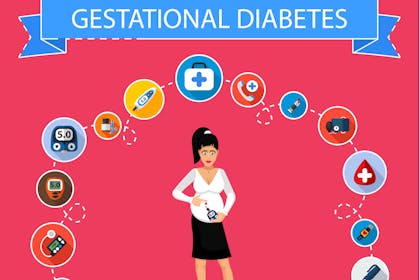If you've been diagnosed with gestational diabetes in pregnancy it can be confusing to know what you can eat, how to control your blood sugar levels and what it means for your baby. Here's what you need to know.
This page contains affiliate links, which means we may earn a small amount of money if a reader clicks through and makes a purchase. All our articles and reviews are written independently by the Netmums editorial team.
What is gestational diabetes?
According to the NHS :
'Gestational diabetes is high blood sugar (glucose) that develops during pregnancy and usually disappears after giving birth.'
'It can happen at any stage of pregnancy, but is more common in the second half.'
FREE NEWBORN NAPPIES
It can cause complications for you – and for your unborn baby – so you'll need to be monitored during pregnancy. However, eating well and getting enough exercise can help to manage the condition.
The good news is, unlike Type 1 and Type 2 diabetes, which are lifelong conditions, gestational diabetes usually disappears after you've had your baby.
What causes gestational diabetes?
Gestational diabetes happens when your body doesn't make enough of a hormone called insulin.
Insulin helps to control your blood sugar levels. When you're pregnant, you need more insulin to keep your blood sugar levels under control. But some women can't produce enough insulin, which leads to gestational diabetes.
Who's at risk?
Gestational diabetes can affect anyone in pregnancy. According to Diabetes UK , it affects about 16 per cent of pregnant women in the UK.
You're more at risk of developing gestational diabetes if:
- you're overweight or obese, with a body mass index (BMI) above 30
- you've previously had a baby who weighed more than 10lb (4.5kg) at birth
- you had gestational diabetes in a previous pregnancy, or a parent/sibling has diabetes
- your family origins are south Asian, Black, African-Caribbean or Middle Eastern
At your first antenatal appointment (between week 8 and week 12), your GP or midwife will establish if any of these apply to you. If they do, you'll then be offered a gestational diabetes screening test later in your pregnancy.
What are the signs and symptoms of gestational diabetes?
You can have gestational diabetes without even realising it – there are usually no specific symptoms.
According to the NHS :
'Most cases are only discovered when your blood sugar level is tested during screening for gestational diabetes.'
(See below for more about this screening test.)
However, some women do develop symptoms if their blood sugar level gets too high – a condition called hyperglycaemia.
According to the NHS, the most common symptoms of this are:
- feeling really thirsty
- needing to wee more often
- having a dry mouth
- increased tiredness
Some of these are also common pregnancy symptoms so it can be hard to work out if they are something to be concerned about.
If you're at all worried about any of the symptoms listed then contact your GP or midwife.
What's the test for gestational diabetes?
The gestational diabetes test – also known as the oral glucose tolerance test (OGTT), or just the glucose tolerance test (GTT) – is usually carried out when you're between 24 and 28 weeks pregnant.
If you've had the condition before, you may be offered the test earlier. And if your midwife finds glucose in your urine at any of your routine appointments, she may offer you the test sooner.
You'll need to go to your local hospital or GP surgery for your OGTT. The test lasts about two hours.
Here's what to expect from the glucose tolerance test:
- At the hospital or clinic, a nurse will take a sample of your blood from your arm.
- You'll then be given a glucose drink, like Lucozade.
- Two hours later, your blood will be tested again to see how your body is coping with the glucose.
You need to have the test on an empty stomach, meaning you can't eat or drink anything (except water) for at least eight hours before the test. As such, the appointments are usually first thing in the morning.
You'll get the results within a few days. You'll be diagnosed with gestational diabetes if:
- Your fasting plasma glucose level (before you have the drink) is 5.6 mmol/L or more.
- Your 2-hour plasma glucose level (2 hours after you have the drink) is 7.8 mmol/L or more.
Some women say that the drink they give you during the glucose tolerance test can taste a bit sickly. You may want to take some mints to refresh your mouth once the test is over. Just be sure to wait until the nurse says it's OK to eat again.
How will gestational diabetes affect my unborn baby?
If you are diagnosed with having gestational diabetes, it can be confusing to know what this means for you and your baby.
The good news is, it's fairly straightforward to manage through diet and, sometimes, medication.
If you don't control your blood sugar level in pregnancy there can be complications for you and your baby. These could include:
- Your baby can grow larger than usual. This could lead to problems delivering your baby. As such, you'd be more likely to need to be induced or to have a caesarean section.
- You could be at higher risk of developing pre-eclampsia . This causes high blood pressure during pregnancy and, if left untreated, can lead to pregnancy complications.
- Your baby could be born prematurely. This is when you give birth before week 37 of pregnancy.
- Increased risk of jaundice for your baby after they are born. They may need treatment in hospital for this after birth.
- A condition called polyhydramnios. This is when there is too much amniotic fluid in your womb, which can cause premature labour or problems during childbirth.
- Stillbirth, although this is rare.
What's the treatment for gestational diabetes?
If you're diagnosed with gestational diabetes, the most important thing is to get used to monitoring your blood sugar level.
Your doctor or midwife will give you a blood sugar monitor and show you how to use it. In a nutshell you'll need to do a finger prick test at different points in the day.
This will produce a drop of blood that you then put on a testing strip. The monitor will read the level of sugar in your blood at that time.
You'll usually be advised to test your blood sugar level once before breakfast, before meals and again about an hour after each meal.
Knowing your blood sugar levels will help you and your doctor or midwife to take the right steps to treat your gestational diabetes. There are two main options for treatment:
- Controlling your blood sugar with diet and exercise.
- Taking medication.
How can diet and exercise control my gestational diabetes?
Diet
According to the NHS , if you're diagnosed with gestational diabetes, you should be referred to a dietitian, who can give you all the info you need and help you plan your meals.
In general, a healthy diet for gestational diabetes involves:
- eating regularly, usually three times a day, without skipping meals
- choosing starchy and low-GI (glycaemic index) foods (such as wholewheat pasta, brown rice, granary bread, all-bran cereals, pulses, beans, lentils, muesli and plain porridge) to reduce blood sugar spikes
- eating at least five portions of fruit and veg a day
- cutting down on sugary foods and drinks (including fruit juices and smoothies) as much as possible
- eating lean sources of protein, such as fish
Exercise
Exercise lowers your blood glucose level and can be a great way to help manage your gestational diabetes.
Your GP or midwife should give you specific advice on exercising, based on your personal fitness levels. But as a general rule of thumb, it's good to aim for at least two and a half hours of moderate exercise a week, plus strength training exercises twice or more a week.
The National Institute for Health and Care Excellence (NICE ) also recommends walking for half an hour after a meal to improve blood glucose control.
Learn more about exercising safely in pregnancy
Will I have to take medication for gestational diabetes?
If you can't keep your blood sugar level under control through diet and exercise, you may need to take medication to help manage your gestational diabetes.
According to NICE , your GP may recommend:
- Metformin tablets - these work to control blood sugar spikes, but can cause side-effects such as nausea, diarrhoea or stomach cramps.
- Insulin injections - these may be offered if metformin isn't working for you, or the side-effects are too severe.
- Glibernclamide tablets - these may be offered if metformin isn't working for you, but you don't want insulin injections.
Be aware that your blood sugar level can increase as your pregnancy progresses. This could mean even though you've got it under control at first, you may need medication later on.
However, according to Diabetes UK:
'Even when medications are needed, changes to diet and physical activity are essential in helping to control your blood glucose levels.'
How will gestational diabetes affect my labour?
If you have gestational diabetes, you may be offered extra ultrasounds to check your baby isn't growing too big. These scans – usually offered at weeks 28, 32 and 36 – will also monitor the amount of amniotic fluid.
From week 38 you'll be offered regular checks to monitor your baby.
If you have kept your blood sugar level under control, and the doctors are happy with your baby, you may be able to wait for labour to start naturally. It's usually fine to try for a VBAC if you and your baby are healthy.
However it's likely you'll be offered an induction or a caesarean section if you haven't given birth by 40 weeks and 6 days.
If scans or other checks suggest that your gestational diabetes could have caused any complications for you or your baby, your midwife or doctor may recommend giving birth (by induction or C-section) earlier than this.
When you go into hospital, make sure you take your blood glucose monitor and any medications you're taking with you.
During your labour and birth, your blood sugar level will be monitored and kept under control by a doctor or midwife. If it's proving hard to control your blood sugar level, you may be given an insulin drip.
How will gestational diabetes affect my baby?
When your baby is born, he will have his blood sugar level tested within a few hours. This is usually a pin-prick of blood taken from his heel.
Provided you and your baby are healthy, you should still be able to do skin-to-skin after the birth.
It's important to feed your baby as soon as possible after birth (within 30 minutes) and then every two to three hours until their blood sugars are stable.
If both your blood sugar levels are normal you're likely to be discharged after 24 hours.
Will I still have diabetes after the birth?
If you already had diabetes before the birth, you'll probably still have it.
But for most women who develop gestational diabetes during pregnancy, blood sugar should go back to normal after the birth.
NICE says that women who didn't have diabetes before pregnancy, but have been taking medication for gestational diabetes, can stop taking the mediation straight after the birth.
If you had gestational diabetes, you should be offered a diabetes test between six to 13 weeks after the birth. This is to check if you could have had undiagnosed diabetes before you became pregnant. If so, you'll probably still have it.
Even if your blood test comes back clear, you may be offered a yearly check for diabetes. This is because women who've had gestational diabetes are more at risk of developing Type 2 diabetes later in life.
Will I get gestational diabetes in future pregnancies?
Unfortunately if you've already had gestational diabetes, it's more likely you'll get it again – two out of three women develop it in subsequent pregnancies.
There are ways you can reduce your risk:
- eat a healthy, balanced diet
- exercise regularly
- try to bring your BMI to under 25
Check out this video from the NHS for more information on gestational diabetes:
Looking for more info on gestational diabetes and having a healthy pregnancy? Check out our articles or swap tips with other mums-to-be in our forum below.
Related stories
How much weight should I gain in pregnancy?






